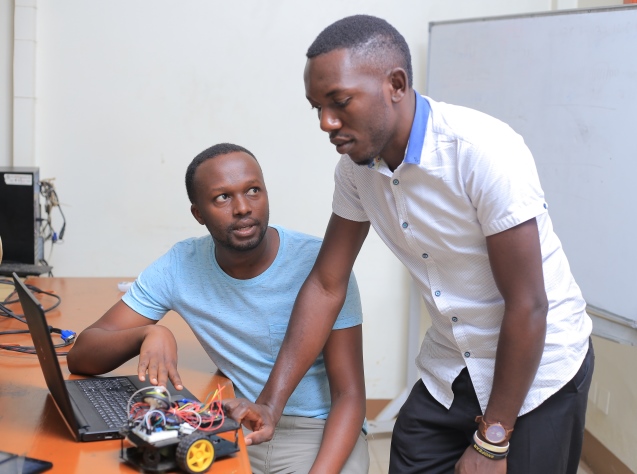 A Brief about the Centre for Innovations and Technology Transfer-Mbarara University of Science and Technology
A Brief about the Centre for Innovations and Technology Transfer-Mbarara University of Science and Technology
Mandate of CITT
The Centre for Innovations and Technology Transfer (CITT) is a permanent home for all innovations, skilling initiatives and technology transfer at MUST. The Centre was approved by the 68th University Council in February 2018 to coordinate all University innovations, skilling and technology transfer from all faculties and students. The Centre provides the overall coordination for innovations and mentors Faculties and other academic/research units in the innovation, skilling, technology transfer and commercialization of efforts by both staff and students. The Centre focuses on prototyping, commercialization and experiential learning that complement the Uganda skilling programme. In implementing its activities, the Centre uses an innovative research-training-production model where a cottage industry that facilitates business development and entrepreneurship at MUST is being pursued. The Centre houses all innovation units in the University including CAMTech project, PHARMBIOTRAC, Business Incubation Clinic (BIC), Software Incubation Unit and supports their activities to the desirable levels. The Centre runs innovative short courses that feed the production cycle.
CITT Vision
To be a global Centre of excellence in affordable technology innovation and commercialization, skills development and entrepreneurship
CITT Mission
To create a multidisciplinary ecosystem to inspire, nurture and promote the conversion of innovative ideas into commercially viable and sustainable products and businesses.
CITT Core Values
Professionalization, Transparency, Teamwork, Accountability, Creativity and Applicability
Aim and Key Functions of CITT
Aim
To respond to the demands of the labor market, the need for contextualized new innovative approaches to solving national, regional and international challenges. We aim at retooling and producing graduates that have knowledge and practical skills to get absorbed in the fast expanding industries and or with entrepreneurial skills to set up their own sustainable businesses.
Key functions
The functions of CITT are premised in its strategic objectives that include the following;
- To provide additional training to less skilled and unskilled graduates and prepare them to apply knowledge to experience with new skills, new attitudes and or new ways of thinking.
- To develop capacity and nurture the spirit of innovation, entrepreneurship and technology transfer among MUST staff, students and the community
- To source for funding towards innovation, technology transfer, retooling and skills development activities at MUST.
- To develop partnerships between academia and industry that will accelerate innovation, technology transfer and commercialization
- To cultivate capabilities suiting emerging job markets and build entrepreneurship spirit and business management competences among employable groups to create employment for themselves and others.
- To establish a job recruitment and selection center for different institutions, organizations and agencies.
CITT structure and establishment
CITT has an Advisory Board of eleven members chaired by the Deputy Vice Chancellor Academic Affairs- Assoc. Prof. Nixon Kamukama. The membership of the Board includes all Faculty Deans, the University Secretary, Legal Officer, Director CAMTech Boston, USA and the Director CITT as secretariat. The Board provides advice and external review on the scope, strategic planning and implementation of CITT management systems, structures, roles and activities. This advisory role is directed towards contributing to the overall strategic direction of the Centre. The Centre management is led by the Director- Dr. Data Santorino assisted by the Deputy Director – Dr. Medard Twinamatsiko. Ms. Rose Kyarisiima is the Office Assistant. The Centre currently has two departments- the Department of Prototype and Technology Transfer and the Department of Experiential Learning and Skilling.
